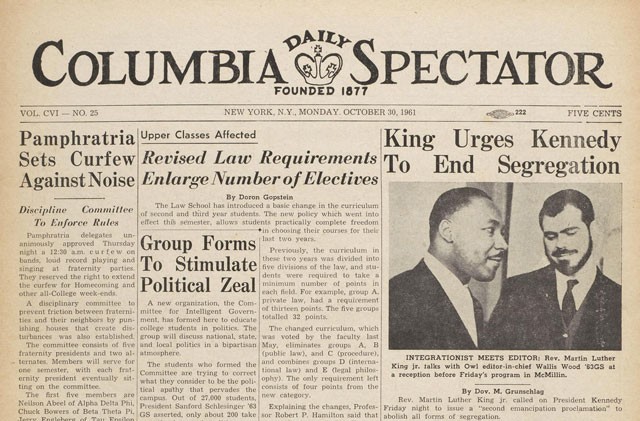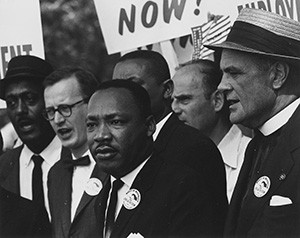Remembering When Martin Luther King Jr. Spoke at Columbia

In honor of today's national holiday honoring Dr. Martin Luther King Jr., we look back to when he came to Columbia on October 27, 1961.
Dr. King addressed a group of students, faculty and members of the community at the McMillan Theatre (now the Miller Theatre) at the invitation of The Columbia Owl, a then-weekly publication of the School of General Studies.
According to a Columbia Daily Spectator story on the event, King spoke eloquently about two campaigns of the Southern Christian Leadership Conference, of which he was president. The first was a voter registration drive in Mississippi, where black voters had been disenfranchised for a century. The other was a push to get U.S. President John F. Kennedy to outlaw segregation in federal programs and other parts of American public life by executive order.
The civil rights leader noted that Lincoln had freed blacks from “the physical bonds of slavery,” according to a New York Times story on King’s speech at Columbia, and he implored Kennedy to issue “a second Emancipation Proclamation” to end segregation. “Morality can’t be legislated, but behavior can be regulated,” he said. “Our laws must control the effects of bad internal attitudes within the individual.”

King went on to say that “the ‘tragic results’ of segregation – poverty, disease, and ignorance – cannot be used as an argument for its continuation,” the Spectator reported.
Some 340 people attended the talk, according to published reports. Money from sales of tickets – $2.00 for regular seats, $3.00 for reserved seats – was contributed to the Southern Christian Leadership Conference, and students representing campus organizations throughout the city presented King with contributions as well.
King’s visit to campus came at a time when the Civil Rights movement was frustrated with the lack of action by both the White House and Congress in the first year of Kennedy’s administration. The Civil Rights movement was in a period of uncertainty, said Ira Katznelson, a professor of history at Columbia.
“President Kennedy had not made segregation or the movement for change central features of his presidency, and the capacity of the struggle for civil rights to actually succeed in ending Jim Crow was unclear at best,” said Katznelson. “At the time, it simply was impossible to project how the program articulated by Reverend King would actually fare.”
An editorial in the Spectator on the eve of King’s visit said. “Fighting for a ‘new South’ is neither a simple nor a pleasant business. It may mean, as in the case of the Freedom Riders, a lonely struggle, confrontation with hostile police, and a harsh fine or a term in a filthy prison with consequent loss of their education.”
It added, “this is an important fight – one which is making a new chapter in American history. We are confident that Columbia students want to join the battle, and that they merely have to be asked.”
Send your questions for Alma's Owl to [email protected]